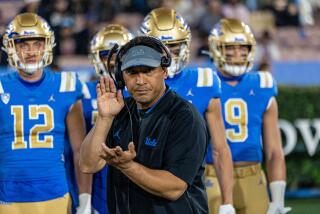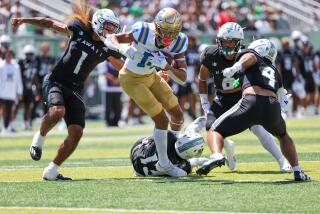Eliel’s Coming Back : College football: Stanford strong safety Swinton emerging from career in disarray and pall cast by death of fiancee.
- Share via
PALO ALTO — Eliel Swinton, like the Stanford football team for which he plays, has been rejuvenated.
Last fall, the former Montclair Prep star from West Hills was in the midst of a nightmare. He entered the season an exuberant 19-year-old, fresh off a promising freshman year and very much in love with his fiancee, Stanford student Jessica Williams.
But Swinton’s sophomore season quickly deteriorated, and life dealt him a shockingly cruel blow when Williams was killed in a car accident last October.
“It blew my mind--it would probably blow anybody’s mind,” he said.
Stunned, grief-stricken and still a teenager, Swinton found no solace on the football field. Stanford won only three games, he missed much of the season because of injuries, and Bill Walsh, the coach, resigned at season’s end.
That was rock bottom. But as Swinton has learned, rock bottom usually doesn’t last. After a year of pain, learning and growth that in some ways mirrored the fortunes of his team, things are looking up for Eliel Swinton--and for Stanford.
He will start at strong safety Saturday against East Carolina in the Liberty Bowl, Stanford’s first bowl appearance since he joined the Cardinal in 1993 after a record-breaking high school career.
More significantly, the sting of his fiancee’s death is fading. Miserable a year ago, Swinton is exhibiting a new-found maturity in all areas of his life, and a sense of hope and optimism for the future are bright within him.
“It’s a big comeback year in general,” he said recently at Stanford. “I know a lot more things now than I did 14 months ago, I’ll tell you that. It’s been a long, hard haul--but it’s cool to come out of it.”
*
Memories of Williams are still strong in Swinton’s mind. He met Williams, from Banning High in Carson, in 1992 at a Stanford freshman orientation. She was pretty, petite and kind, “the greatest person ever,” Swinton said. “She was beautiful, a great person . . . I could go on and on.”
And amid the recollections of Williams lies one horribly ironic incident he cannot shake. About a week before the accident that would claim Williams’ life, Swinton was driving in a car with her on the Stanford campus.
“I said, ‘Put your seat belt on,’ ” Swinton said, “and she said, ‘We’re just going around the corner.’ ”
He reminded her of a recent car accident he had been in, and how his seat belt protected him. She relented and did as he asked.
One week later, Williams was riding in a car with seven other women on a freeway in Oakland, when their car swerved from the left lane and struck the divider.
She was not wearing her seat belt. She was the only one who did not survive. Swinton maintains she would have lived had she worn the belt.
“I’m definitely angry at her,” Swinton says, 14 months later. “She deserves a good screaming-at, know what I’m saying? It should definitely not be like this. . . .”
*
The shock of the accident was understandably terrible last fall, though Swinton tried to suppress it.
“I tried to hide it, but inside I was just tearing myself up,” he said. “My mind was going eight different ways, I couldn’t concentrate on things, I started drinking heavy a little bit.”
His football career also was in disarray, dating from before Williams’ death. After an early season loss, Swinton said he attempted to inspire his teammates by making comments to reporters.
The plan backfired. Walsh and some veteran players took exception to the remarks and the coach retaliated by ripping Swinton publicly. Nagging hip and thigh injuries also forced Swinton to miss most of five games, and the Cardinal limped to a 3-7-1 record.
But in the off-season, a time of healing began. Swinton’s father, Oscar, worked on his son’s philosophical outlook by talking to him and providing him with self-help reading material. Swinton’s mother, Paula Hawthorne, supported her son and shared her Jehovah’s Witnesses religious faith. Williams’ mother, Helen, offered comfort.
When Walsh resigned last November, he was replaced by Tyrone Willingham, a no-nonsense coach who believes in discipline, kindness and the power of positive thinking. A couple of weeks after Willingham was hired , he began speaking with Swinton about his problems.
“That cleared my mind up, and helped me focus,” Swinton said.
Since then, progress has come in fits and starts. Always gregarious and fun-loving, Swinton was thought to be too flamboyant by his new coaches, which they made plain to him in spring practice “many times,” Swinton said, with a laugh. Since, he has toned down his behavior.
Said Willingham: “I think what we’ve tried to do with Eliel is not curtailing his energy and enthusiasm, but allowing him to really focus on the task at hand and really what goes into accomplishing a goal.”
Willingham and his staff also helped Swinton get back on track to fulfilling his athletic potential.
He was a record-setting running back at Montclair Prep, rushing for 5,904 yards and 67 touchdowns.
He was selected a high school All-American by many publications, but when he arrived at Stanford it quickly became apparent that fellow freshman running back Mike Mitchell--more heralded than Swinton-- would be getting most of the carries.
So Swinton volunteered to switch to defense and wound up starting at all four defensive backfield positions. He had 57 tackles, one sack, one interception and was honored as the team’s outstanding freshman.
But last season, the coaches wanted to play him full time at cornerback, a position he disliked. He played, but it was a forgettable year for many reasons, and he finished with only 23 tackles.
In the off-season, coaches offered to switch Swinton to strong safety and the 5-foot-11, 195 pound junior jumped at the chance.
“I hated corner, hated it,” he said. “You’re always on an island by yourself, not part of the game. At safety you’re part of the game, you can go make tackles and you don’t have to worry about covering anybody one on one. I love it.”
He became a starter this season in the team’s fourth game and finished with 66 tackles, including six for losses. He played a part in the team’s dramatic turnaround to a 7-3-1 record, which Swinton attributes to the arrival of Willingham, the maturation of the talented-but-young Stanford team, and the squad’s unwillingness to endure a third consecutive losing season.
On the field, he is more focused and disciplined. Off the field, he is less flamboyant and quietly confident. “I don’t try to be the center of attention anymore,” he said. “I just try to be me.”
He has learned how to deal with the death of a loved one, mostly through his own experience, and also through watching Willingham, whom he refers to as “a second father.” Willingham’s own father died suddenly in September.
“I had the opportunity to work through my dad’s passing, and I think that in some regards that might have been an aid or some type of benefit to Eliel,” Willingham said. “You have to make a decision in life: either you have to give up or you have to keep going . . . and deal with life and go ahead and make strides and do things as you believe that loved one would have you do.
“I think Eliel has really started to grow and develop and mature this year through the situation that he’s had to encounter.”
Although the pain of Williams’ death has not left Swinton, he is philosophical.
“I still cry some nights when I think about her and get really depressed,” he said. “But it taught me to value people while they’re here. It puts a lot of things in perspective.”
More to Read
Go beyond the scoreboard
Get the latest on L.A.'s teams in the daily Sports Report newsletter.
You may occasionally receive promotional content from the Los Angeles Times.










